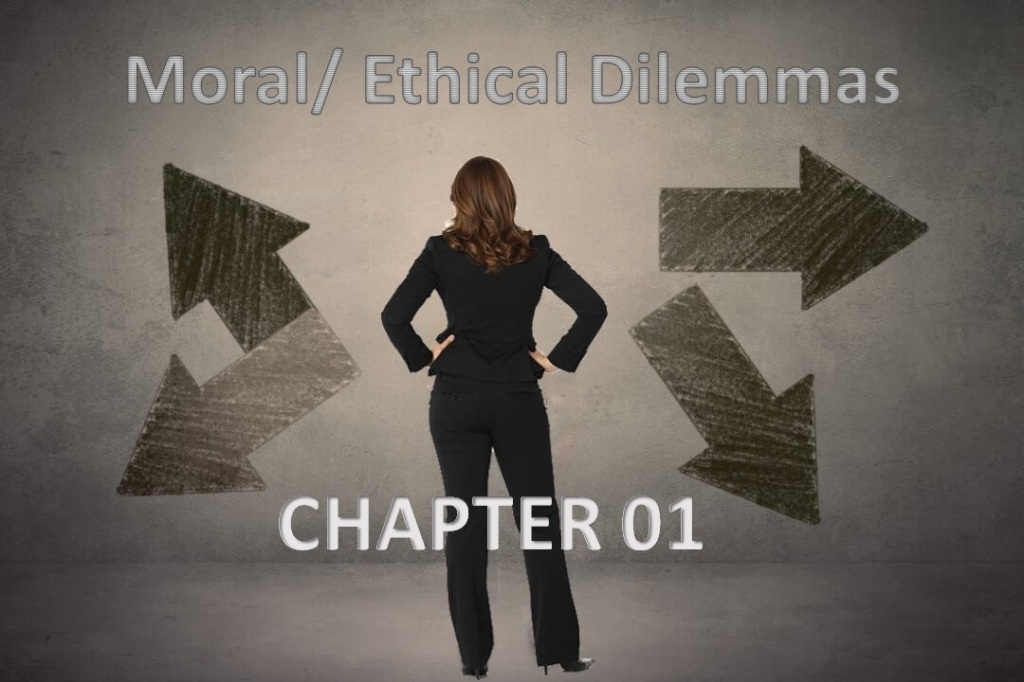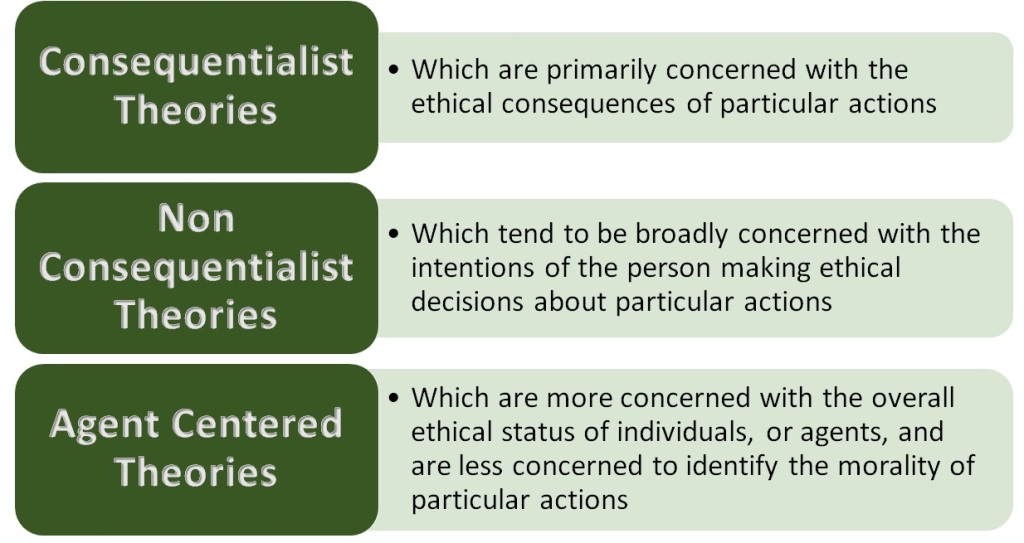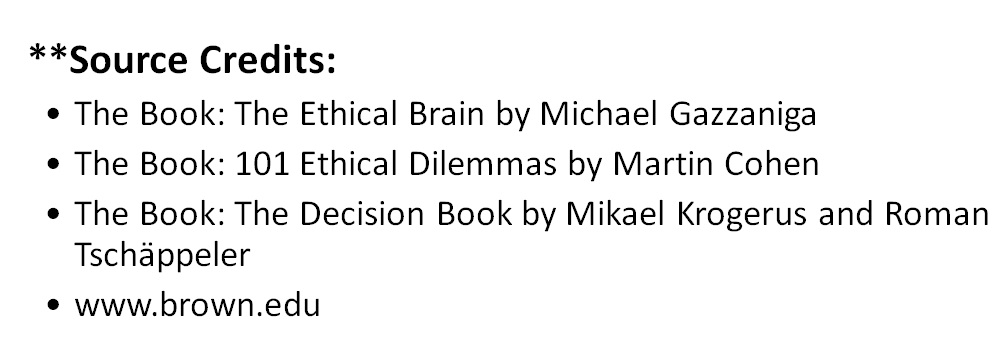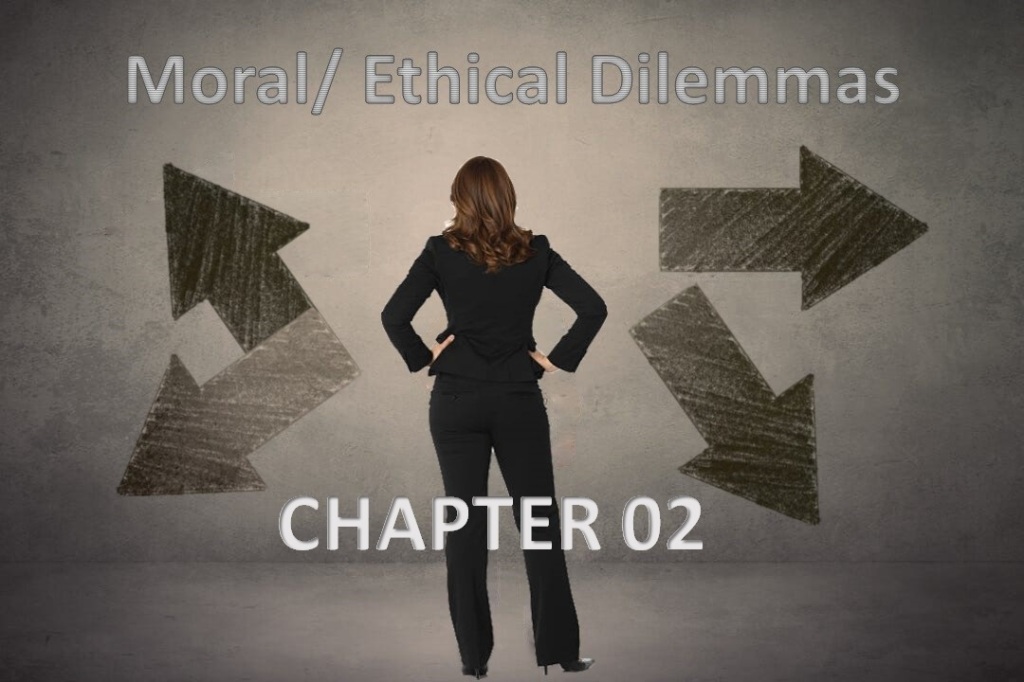
***Continued from Chapter 01 (Covered previously: Meaning of Ethics/ Morals, Traditional Interpretations Of Ethics, Three Broad Types of Ethical Theory, Interpretation of Moral/ Ethical Dilemmas)
Link to Chapter 01:
Moral Dilemma Questions
In a time when many question our national moral character, pondering what to do in various situations can be a positive exercise preparing an individual for worst-&-best-case. We will look at some examples of moral dilemma questions to aid in placing ourselves in the midst of them.
01. The Unfaithful Friend
You go out with your spouse for dinner at a new restaurant you have not frequented before. It is in a part of town you rarely visit. You are shocked to see your friend’s spouse having dinner with a very young, attractive person. From the way they are behaving, it is obvious they are more than friends. The couple finish their meal and leave without seeing you. They behave very affectionately on the way out the door.

02. An Office Theft
You are in charge of the petty cash at the office. However, a co-worker is responsible for making a weekly trip to the bank to make the business deposit and obtain petty cash for the following week. In a conversation with your mutual supervisor, you are asked if the increase in the petty cash amount was enough. You, however, have not seen any additional money. You realize your co-worker has been pocketing the additional money.
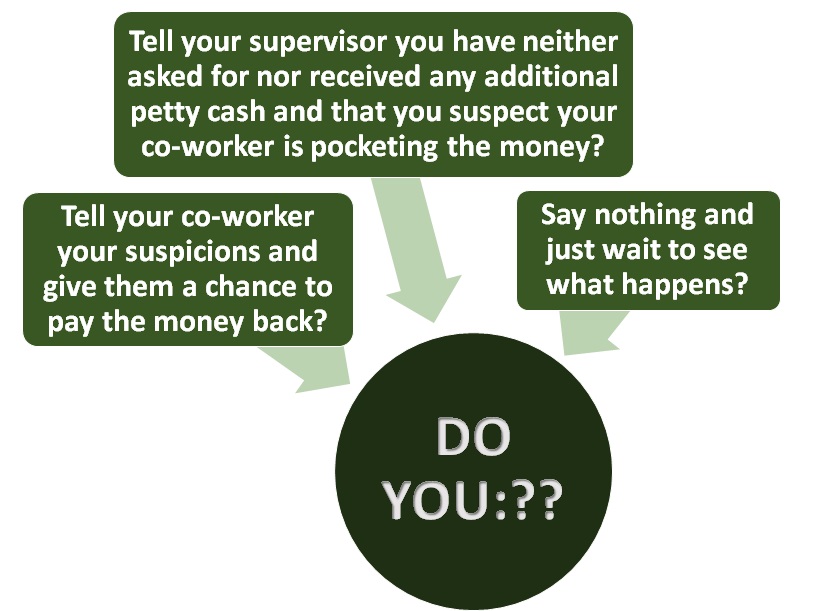
03. Midnight Death
You have worked years to be successful in your father’s business. You felt you were obligated to take over as he worked his whole life to build the business left to him by his father. However, the large businesses in town have seriously cut into profits and for several years you and your family have just managed to scrape by. Your father’s health has declined and he has been hospitalized. He has a substantial life insurance policy that expires at midnight. If he dies before midnight, you will inherit enough money to pursue a career you have always dreamed of and provide adequately for your family.

04. Get Rich
Your friend offers you an opportunity to make a great deal of money very quickly. He has arranged to set up an off-shore account for your profits. He will not tell you exactly how he is making this money, but you get the impression it is not exactly legal. He only wants an investment of Rs 50,000/- and promises you will have enough from your minimal investment that you will never need to work again.

05. Telling a Secret
Your friend tells you that they committed a crime. They explain that they are having trouble sleeping at night and feel you are the only one they can trust with their confession. A few days later, you read in the paper that someone has been arrested for your friend’s crime.
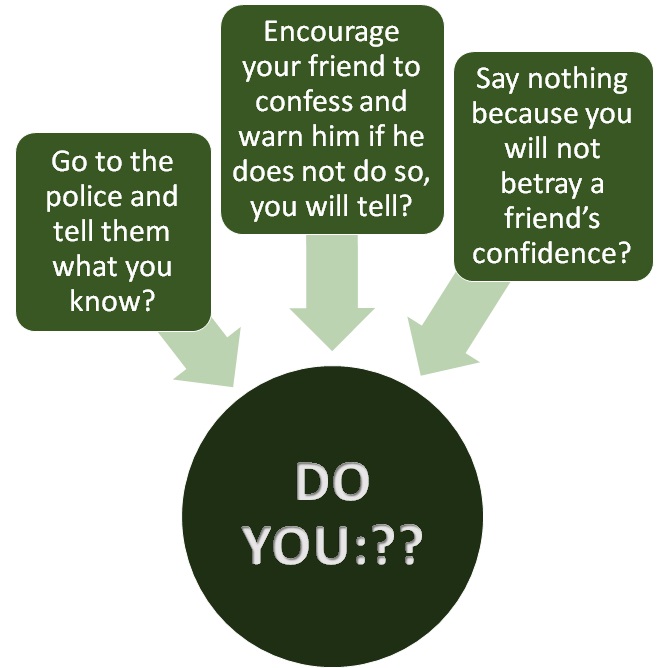
Moral Dilemma Scenarios
Here are some moral dilemma scenarios. Each scene is characterized by the need to make a difficult decision. As with all moral dilemmas, there is no right or wrong.
01. Sarcastic Friend
Your friend has a great sense of humour. However, sometimes his jokes involve making fun of others in inappropriate ways. He will point out a physical flaw or look for something odd or different about a person and make an unkind comment. You feel uncomfortable when your friend does this. Do you say something or just laugh along with him?
02. Hit and Run
Late one night you are driving home in a bad rainstorm. A drunk reels out in front of your car and you try to stop, but hit him. Nobody sees you. The guy looks and smells as if he is homeless. You check to see how badly he is hurt and realize he is dead. You have never even had a speeding ticket and are an upright, professional, with a family and are well-known and respected in your community. Do you make a report anonymously, confess your crime, or drive on home and forget about it, knowing no one is going to pursue the death of a homeless drunk?
03. Third Chance
Your teenager has had a rough few years. First came an arrest for shoplifting. The item was of little value, so it was only a misdemeanour. Then your teen was with some friends who were smoking pot and driving too fast. Your teen has promised they are turning over a new leaf and seem to be on the right track, doing better in school, coming home by curfew, and generally having a much better attitude. Now you get a call from the local police station saying your son was with a group of kids who broke into a liquor store and stole beer. Do you go to the station and see how you can get your teen out of this jam or let him accept whatever consequences befall him?
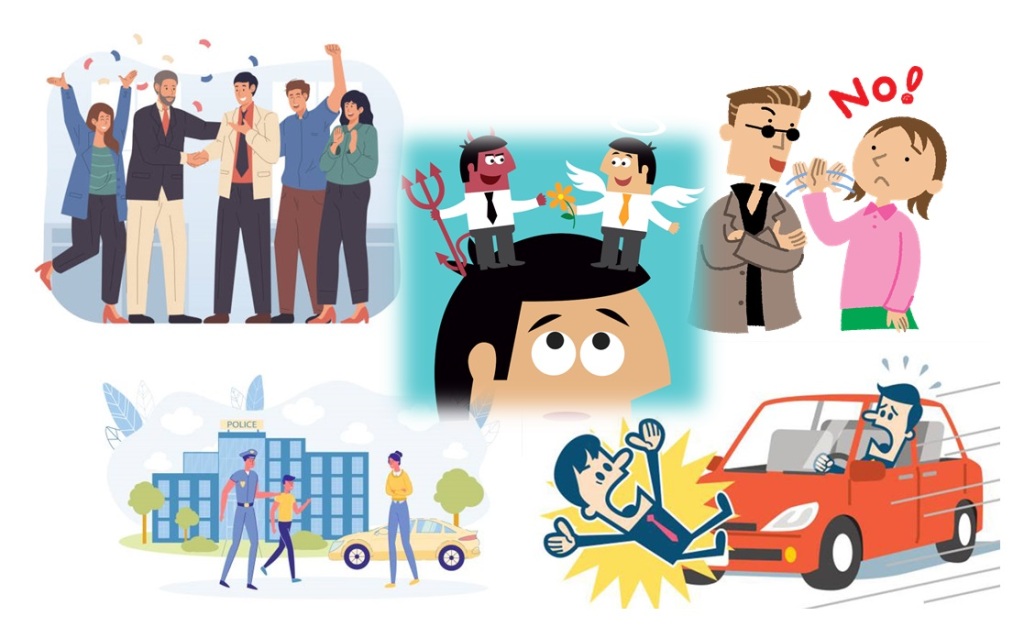
04. Reward a Job Well Done
You understand the importance of team work in your job. You share ideas and responsibilities with your team members on a daily basis. In your weekly team meeting with your supervisor, one of your co-workers takes credit for a time and money saving change in operating procedures you devised. Your supervisor erroneously thinks your co-worker came up with the change and your co-worker does not correct the misinterpretation, but allows the boss to not only commend him, but offer a bonus. Do you go to your co-worker and demand he correct the situation, go to your supervisor and explain you should receive the commendation and reward, or keep quiet as you do not believe in ownership of ideas?
Moral Dilemma Questions
Moral dilemma questions might be characterized as “What if?” questions. It can be hard to take a close look at ourselves and ask, “Will I do the right thing when confronted with a difficult choice?” Frequently, it is the small decisions we make that truly define our moral character.
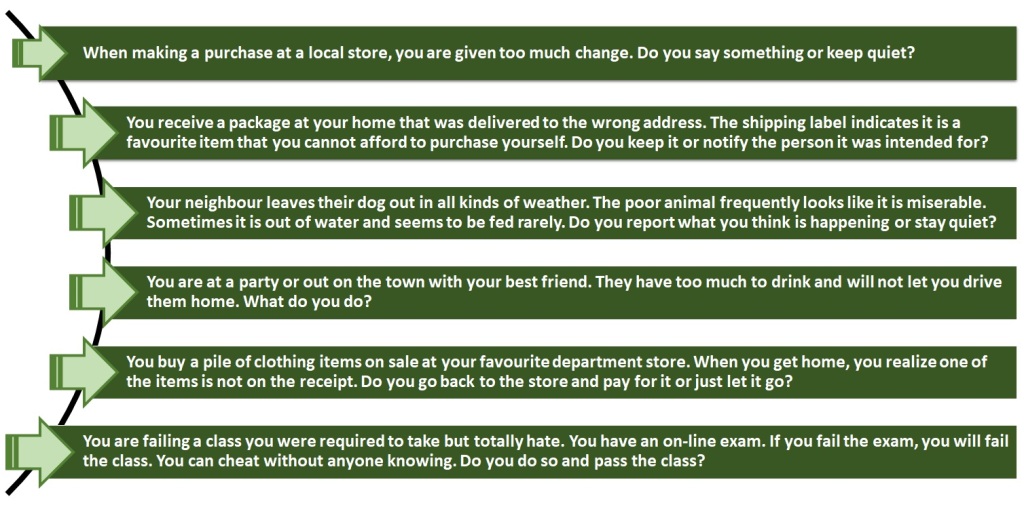
Approaches For Ethical Decision-Making
The more novel and difficult the ethical choice we face, the more we need to rely on discussion and dialogue with others about the dilemma. There are three broad frameworks to guide ethical decision making:
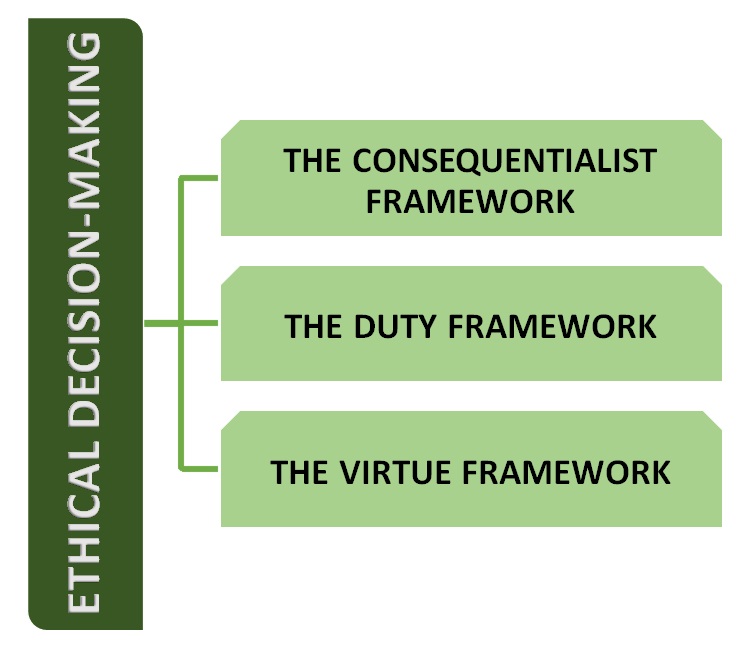
While each of the three frameworks is useful for making ethical decisions, none is perfect—otherwise the perfect theory would have driven the other imperfect theories from the field long ago. Knowing the advantages and disadvantages of the frameworks will be helpful in deciding which is most useful in approach the particular situation with which we are presented.

In many situations, all three frameworks will result in the same—or at least very similar—conclusions about what to do, although they will typically give different reasons for reaching those conclusions. However, because they focus on different ethical features, the conclusions reached through one framework will occasionally differ from the conclusions reached through one (or both) of the others.
The Importance of Studying Moral/ Ethical Dilemmas
The exploration needs to dig deeper, taking into consideration not only how to make difficult decisions, but how the decisions reflect the underlying values that are important to us. The practice will not only foster better ethical decision-making, but exercises that require assessments of ethical dilemmas can improve reasoning and critical thinking skills—valuable assets in many contexts.
Ethical training develops important “soft skills” like respect, empathy and compassion. Exploring conflicts from different points of view—and striving to understand the value behind an opinion—also makes us more empathetic to others. Identifying the principles that comprise the foundation of our beliefs as well as those that guide others allows us to hone social and emotional competencies like self-awareness and social awareness.
A Framework for Making Moral/ Ethical Decisions
Decisions about right and wrong permeate everyday life. Ethics should concern all levels of life: acting properly as individuals, creating responsible organizations and governments, and making our society as a whole more ethical. One Framework that can be applied in daily instances may be:
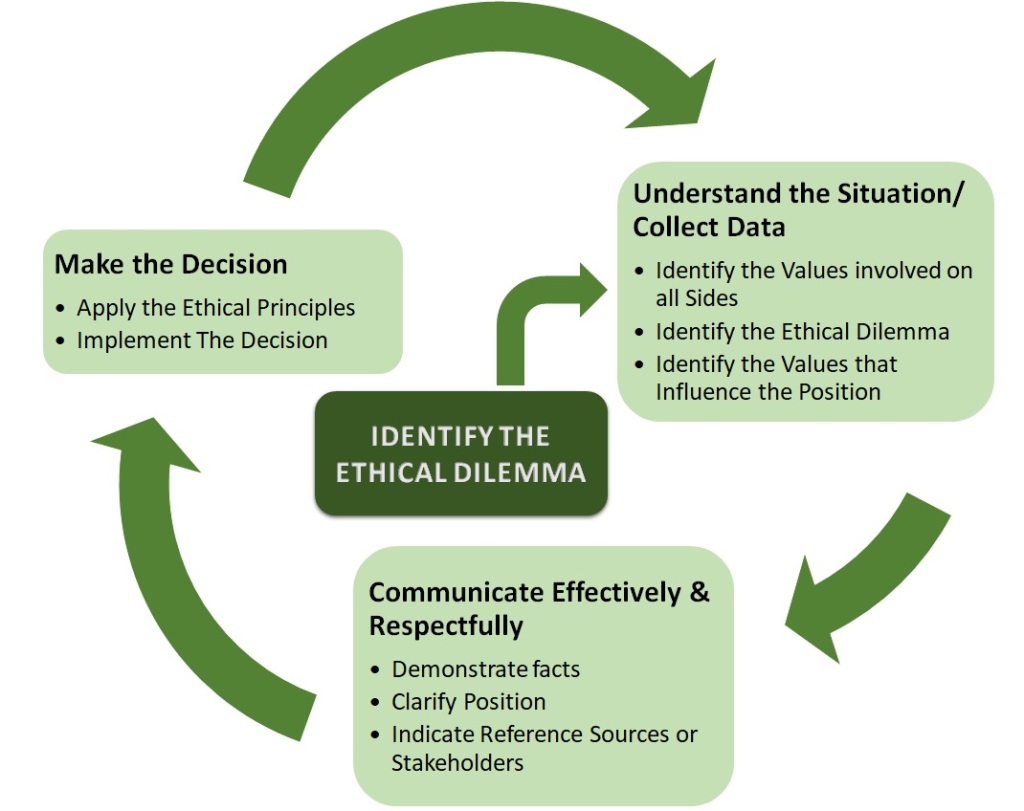
Making moral/ ethical decisions requires sensitivity to the ethical implications of problems and situations. It also requires practice. Having a framework for ethical decision making is essential for individuals and organizations.
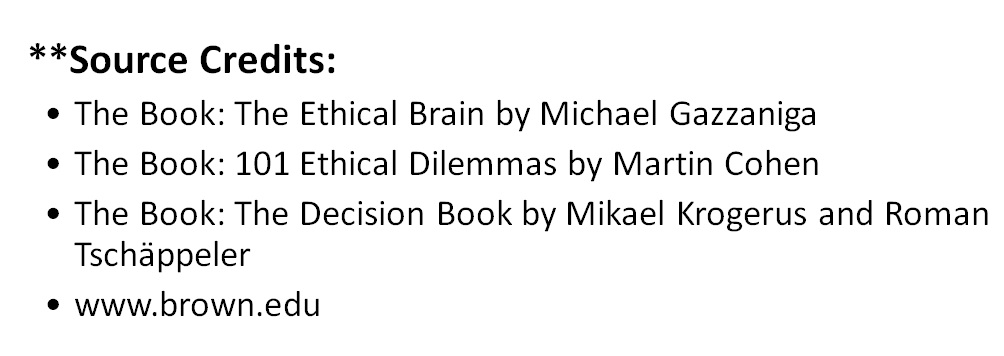
Content Curated By: Dr Shoury Kuttappa


